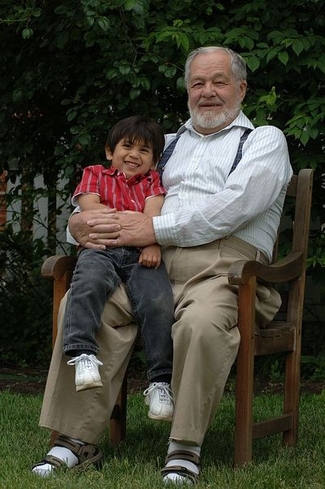AMID THE DIN over illegal immigration, I have been thinking about two immigrants I happen to know rather well.
One is a 3-year-old boy from southern Guatemala. He was brought to the United States in March 2004, one of 11,170 adopted orphans to immigrate that year. The other, who will turn 81 in August, comes from a small village in what is now Slovakia. He entered the United States in the spring of 1948, a few months before his 23d birthday.
Born an ocean and 78 years apart, these two immigrants might seem on the surface to have little in common. But as naturalized US citizens, they in fact have a great deal in common. English, to mention the most obvious example, is the primary language for both. Neither retains the customs of his native land. Both have a share in the American constitutional patrimony.
The little boy from Guatemala is my younger son. The older man from Slovakia is my father.

America is a richer place because my father and son are here, and no doubt most Americans -- even those now clamoring for a crackdown on illegal immigration -- would agree. Signs reading, "We love legal immigrants," have been on display at rallies organized to oppose amnesty for illegal immigrants. Another popular sign demands: "What part of illegal don't you understand?"
To countless Americans, the difference between legal and illegal immigration is self-evident and meaningful. But is that really what distinguishes the immigrants we want from those we don't -- that the former enter the country lawfully, while the latter break the rules to get here? Are immigrants like my father and son inherently desirable merely because a lot of exasperating bureaucratic requirements were met before they came? Are the 11 million illegal immigrants living within our borders unwelcome and problematic only because they got in the wrong way?
A foreigner who enters the United States without first running the immigration-law gantlet is not congenitally unfit to be a good American any more than someone who operates an automobile without a license is congenitally unfit to drive. Our immigration laws are maddening and Byzantine. They are heavily skewed in favor of people related to US citizens -- nearly two-thirds of all legal immigrants qualify to enter the United States because they are the relatives of someone already here. If you were designing an immigration system that would admit people on the basis of whether they seemed likely to become good Americans -- patriotic, hard working, law-abiding, English-speaking -- this is hardly the system you would devise.
In so many other contexts, Americans admire self-starters and risk-takers who find ways to get around roadblocks that would defeat less inventive, determined, or gutsy individuals. Of course it is vital, especially after 9/11, to properly control the nation's borders. But there is still something to be said for the self-starters and risk-takers who look at the formidable roadblocks we place in the path of most would-be immigrants, especially those not related to a US citizen -- and make up their minds to find a way around them. In his televised remarks last week, President Bush noted that many illegal aliens "will do anything to come to America to work and build a better life. They walk across miles of desert in the summer heat, or hide in the back of 18-wheelers to reach our country." Aren't those the kind of people America should crave -- men and women willing to risk everything, including their lives, for a chance to build their own American dream?
Yes, porous borders are a national-security problem, one too long neglected. But the burning immigration problem of our time isn't that too many people are breaking the rules to get in. It is what they are finding when they get here.
Instead of a national commitment to assimilation, a cynical multiculturalism sends the message that our culture is no better than any other, so there is no particular reason to embrace the American experience. "Bilingual" education and foreign-language ballots accelerate the loss of a common English tongue, making it easier than ever for newcomers to cluster in linguistic ghettoes. Identity politics erodes the national identity, encouraging immigrants to see themselves first and foremost as members of racial or ethnic groups, and only secondarily as individuals and Americans.
From the day he got off the boat from Europe, my father lived up to the code that expected immigrants to go to work, learn the language, obey the laws, and become an American. My immigrant son, I hope, will live up to it too. The melting pot, it used to be called, before political correctness intervened. That political correctness is what has caused the present crisis. The crisis won't be solved by blaming the immigrants.
(Jeff Jacoby is a columnist for The Boston Globe).
-- ## --
Follow Jeff Jacoby on Twitter.
"Like" Jeff Jacoby's columns on Facebook.
Want to read more Jeff Jacoby? Sign up for "Arguable," his free weekly email newsletter

